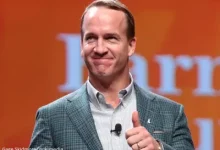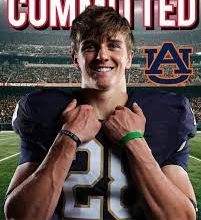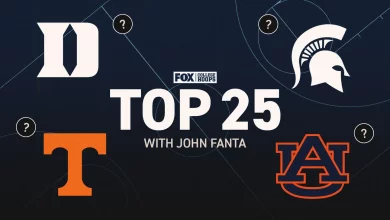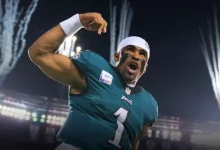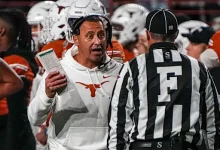With the CFP and scheduling as their biggest threat, Marcus Freeman wants Notre Dame Football to remain independent as long as possible.
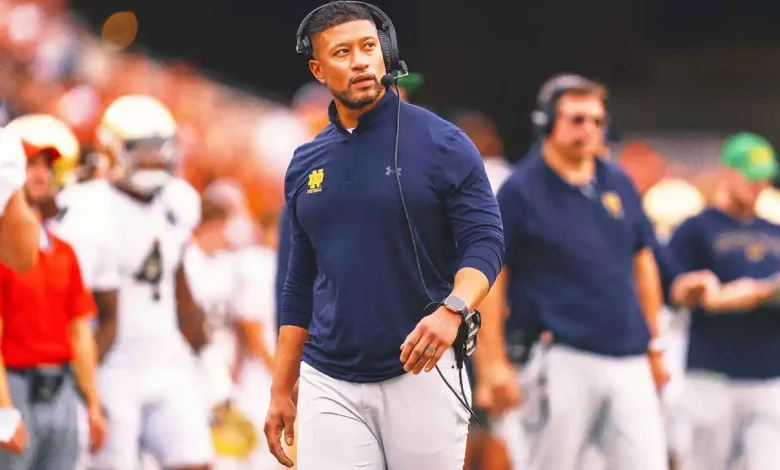
In an era where the tectonic plates of college football are constantly shifting — realignments, mega-conferences, NIL-driven transfers, and expanded playoff structures — Notre Dame football finds itself in a familiar position: standing alone, but standing firm. While many programs scramble to secure a seat at the table of ever-growing power conferences, Notre Dame continues to march to its own beat. For head coach Marcus Freeman, that independence is not just symbolic — it’s strategic, cultural, and worth preserving as long as the game will allow it.
There’s a defiant pride in the way Freeman discusses Notre Dame’s status as a football independent. He doesn’t dance around the challenges. He acknowledges the scheduling complexities. He understands the growing pressure that College Football Playoff expansion and television deals are placing on non-affiliated programs. But he also understands the deeper value that independence brings to the program — and the unique leverage it affords. When asked recently whether Notre Dame’s independence has a shelf life, Freeman was direct: “As long as it makes sense for our players, for our program, and for our university, we will fight to remain independent. That’s who we are. That’s who we’ve always been.”
For decades, Notre Dame’s independence has been a central pillar of its identity. It allowed the Irish to play coast to coast, to honor historic rivalries, and to remain untethered to any one regional or political football entity. It was born out of necessity in the early 20th century, when Notre Dame — as a Catholic institution — was effectively shunned by some Midwestern leagues. Over time, it became a mark of national relevance, a defiant badge of honor. No one school dictated Notre Dame’s path. They set their own course — a course built on tradition, excellence, and the belief that a truly national program should play a truly national schedule.
But in 2025, that model is under more strain than ever before. The College Football Playoff’s expansion to 12 teams, including automatic bids for the top-ranked conference champions, has already raised critical questions about the long-term viability of remaining outside a conference structure. If Notre Dame can’t secure a top-four seed due to its independence, and thus can’t earn a first-round bye, does that place it at a structural disadvantage in the postseason? Is the program handicapping itself by choosing tradition over convenience?
Freeman doesn’t dodge those questions. He answers them with a kind of quiet resolve that reflects both confidence in his team and respect for the program’s history. “Look, we know the rules. We know the challenges. But we also know what makes this place special. We recruit nationally. We play nationally. We represent something bigger than just a region or a league. We’re not going to throw that away for short-term comfort.”
Still, there’s no denying that the road ahead is steep. The new scheduling reality requires precision. Freeman and athletic director Pete Bevacqua must now assemble a slate each year that includes enough top-tier opponents to impress the playoff committee — and enough balance to avoid burning out the roster before November. With the Big Ten and SEC swallowing up major programs and locking in eight- or nine-game league slates, the pool of elite out-of-conference options is narrowing. Notre Dame has already had to get creative to preserve traditional rivalries with USC, Navy, and Stanford, while also locking in occasional heavyweight matchups with schools like Georgia, Clemson, and Ohio State.
The television landscape, too, is changing rapidly. Notre Dame’s longstanding partnership with NBC, which stretches back to 1991, has been both a financial lifeline and a branding triumph. It helped catapult the program into living rooms across America every fall Saturday. But as the SEC and Big Ten ink increasingly lucrative deals with ESPN, FOX, and streaming platforms, the disparity in media revenue is widening. While Notre Dame still commands a powerful brand and draws ratings, the pressure is mounting to match the financial clout of its conference peers.
Even so, the university has held firm. The administration, alumni base, and broader Notre Dame community continue to champion independence not merely as a football strategy, but as an institutional philosophy. It allows Notre Dame to maintain complete control over its academic and athletic priorities. It enables the program to align its mission with its values — and to avoid being a pawn in larger conference battles over money and media markets.
Freeman, now in his third full season as head coach, has embraced that model with open arms. From the moment he stepped onto campus, he made it clear that he wasn’t just recruiting players — he was recruiting people who understood what Notre Dame represents. Independence, to Freeman, is part of that pitch. It’s a differentiator. It’s a symbol that Notre Dame does things differently — and unapologetically so. It may not be the easiest path, but it’s the one that builds the kind of toughness, adaptability, and national reach that Freeman believes wins in the long run.
That belief is echoed in recruiting circles, where Notre Dame has continued to punch above its weight despite lacking conference affiliation or consistent top-10 NIL budgets. In fact, some parents and recruits have cited Notre Dame’s independence as part of the appeal — a program that’s national in scope, ambitious in vision, and rooted in something more enduring than the latest trend. “They’re not chasing money or followers,” one recent commit’s father said. “They’re building men. And they’re doing it their way.”
The College Football Playoff remains the largest structural hurdle. Under the new 12-team format, Notre Dame is eligible to make the field, but ineligible to receive a top-four seed — and thus, a first-round bye — because it is not a conference champion. That rule, by design or coincidence, appears to tilt the scales against independents. Critics argue it places Notre Dame at a disadvantage, forcing them to win four playoff games instead of three to secure a national title. Freeman acknowledges the obstacle but refuses to let it become an excuse. “If we want to be champions, we’ll take whatever path we have to. Whether it’s three games or four. We’ll prepare. We’ll compete. And we’ll do it without compromise.”
There’s also the very real question of scheduling equity. As the SEC and Big Ten grow to super-league proportions, they’re increasingly less incentivized to play difficult non-conference games. If Notre Dame cannot schedule enough high-quality opponents, will the selection committee penalize them for strength of schedule? Will conference loyalties and closed scheduling ecosystems effectively wall Notre Dame out? These are concerns that Bevacqua and Freeman are working on constantly — both through formal relationships with schools and quiet lobbying of playoff committee members.
Despite those obstacles, the Irish have managed to remain relevant and competitive. A top-10 finish, a New Year’s Six bowl, and multiple top-five recruiting classes have proven that the model can still work — and still win. Freeman’s energy, relatability, and modern outlook have re-energized a fan base that sees independence not as a burden, but as a beacon.
Yet even the most optimistic Notre Dame fans know the clock is ticking. The sport’s center of gravity is shifting toward consolidation. If television contracts and playoff formats continue to squeeze out independents, Notre Dame may one day have no choice but to join a league — most likely the Big Ten, where natural rivalries, academic parity, and geographic overlap would ease the transition. But that day, if it comes, won’t arrive quietly. It will come only after every other option is exhausted.
For now, Freeman and Notre Dame remain committed to the independent path. They continue to build a schedule that rivals anyone’s. They continue to recruit coast-to-coast. And they continue to prepare their players not just for the next game, but for the next 40 years. That mission, Freeman says, is only possible when the school retains its autonomy.
There’s a certain poetry in that. In an age when programs are defined by TV deals and conference brands, Notre Dame defines itself. The independence isn’t just tradition — it’s strategy. It’s culture. And it’s freedom.
Whether that model can survive another decade of college football chaos is uncertain. But Marcus Freeman is determined to ride it as long as the road allows. And if that road gets tougher, he’s fine with that.
Because at Notre Dame, the hard way has always been the only way.

